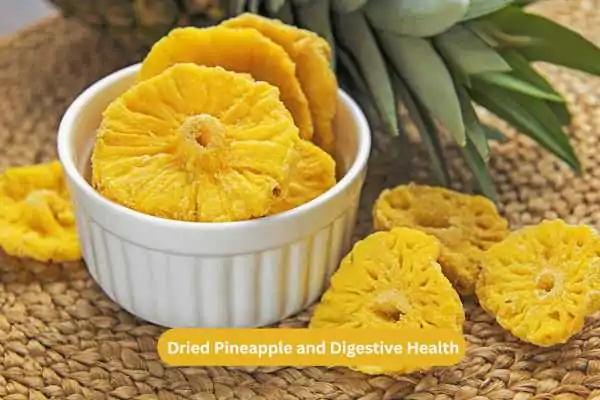Dried pineapple is more than just a sweet and chewy treat—it’s a tropical delight packed with essential nutrients that support overall well-being. Among its many benefits, one of the most notable is its contribution to digestive health. For those in the UK seeking natural, flavourful ways to improve gut function and fibre intake, dried pineapple offers a simple yet effective solution.

In this article, we’ll explore how dried pineapple promotes healthy digestion, why fibre is essential for your gut, and how you can incorporate this delicious fruit into your diet.
Understanding the Role of Fibre in Digestion
Fibre plays a crucial role in maintaining a healthy digestive system. It comes in two forms: soluble fibre and insoluble fibre. Soluble fibre dissolves in water, forming a gel-like substance that helps regulate blood sugar and cholesterol levels. Insoluble fibre, on the other hand, adds bulk to stool, promoting regular bowel movements and preventing constipation.
A balanced diet rich in both types of fibre supports the gut microbiome—the community of beneficial bacteria living in your digestive tract. These bacteria aid in breaking down food, absorbing nutrients, and protecting against harmful pathogens.
Unfortunately, many people in the UK fall short of the recommended daily fibre intake. According to health experts, adults should aim for around 30 grams of fibre per day, yet most consume much less. This is where dried pineapple can help bridge the gap.
How Dried Pineapple Supports Digestive Health
1. Rich Source of Dietary Fibre
Dried pineapple is naturally high in dietary fibre, particularly insoluble fibre. This type of fibre adds bulk to the stool and helps it move smoothly through the intestines, reducing the risk of constipation. Including a small portion of dried pineapple as part of your daily snack routine can make a noticeable difference in digestive comfort.
2. Contains Natural Enzymes
One of the standout features of pineapple is bromelain, a natural enzyme that helps break down proteins in the stomach. Bromelain supports efficient digestion, making it easier for your body to process meals, especially those rich in meat or dairy. While some enzyme activity decreases during drying, trace amounts remain in dried pineapple, offering subtle digestive support.
3. Gentle on the Stomach
Compared to processed snacks or high-fat foods, dried pineapple is light, natural, and easy to digest. Its mild sweetness makes it appealing to both children and adults, and it can help satisfy sugar cravings without resorting to artificial sweets that may irritate the digestive tract.
4. Promotes a Healthy Gut Microbiome
The fibre in dried pineapple acts as a prebiotic, feeding the beneficial bacteria in your gut. A balanced microbiome is linked to improved digestion, stronger immunity, and even better mood regulation. By incorporating dried pineapple into your diet, you’re helping nurture your gut from the inside out.
Nutritional Benefits Beyond Fibre
While the focus is on digestive health, dried pineapple provides several other nutritional advantages worth mentioning:
-
Vitamin C: Supports immune health and aids in collagen production.
-
Manganese: Essential for metabolism and bone strength.
-
Antioxidants: Help combat oxidative stress and inflammation in the digestive tract.
These nutrients work together to promote not only gut health but also overall vitality.
How to Add Dried Pineapple to Your Diet
Incorporating dried pineapple into your daily routine is both simple and enjoyable. Here are a few easy ideas:
-
Snack on it directly: A handful of dried pineapple pieces make a satisfying, naturally sweet mid-day snack.
-
Mix into breakfast: Add chopped dried pineapple to your morning porridge, muesli, or granola for extra texture and flavour.
-
Blend into smoothies: A few pieces of dried pineapple can enhance the taste and fibre content of smoothies.
-
Bake with it: Include it in healthy muffins, energy bars, or fruit breads for a tropical twist.
-
Combine with nuts: Pair dried pineapple with almonds or cashews for a balanced snack that combines fibre, protein, and healthy fats.
When purchasing dried pineapple, look for unsweetened or naturally dried varieties to avoid unnecessary added sugars. Many UK health food shops and online retailers now offer these options, making it easier to find wholesome products.
Portion Control and Considerations
Although dried pineapple is nutritious, it’s important to enjoy it in moderation. Drying fruit concentrates its natural sugars and calories, so portion control is key—typically around 30 grams (a small handful) per serving is ideal.
If you’re managing blood sugar levels or following a calorie-controlled diet, pair dried pineapple with high-protein foods like Greek yoghurt or nuts. This combination helps balance energy release and prevents spikes in blood sugar.
Supporting Digestive Wellness Naturally
Maintaining good digestive health doesn’t require drastic changes. Small, consistent habits—like including fibre-rich foods such as dried pineapple—can make a significant difference. Combined with a balanced diet, adequate hydration, and regular exercise, it supports long-term gut health and overall wellness.
For those in the UK seeking convenient, natural options, dried pineapple offers a balance of flavour and function. It delivers essential fibre, gentle digestive support, and a touch of tropical sweetness—all without compromising on health.
Final Thoughts
Dried pineapple is a simple yet powerful addition to a gut-friendly diet. Its natural fibre content, gentle enzymes, and prebiotic properties make it an excellent choice for anyone looking to improve digestive health while enjoying a tasty, satisfying snack.
Whether eaten alone or added to meals, dried pineapple brings together the best of nutrition and taste—a truly delicious way to care for your digestive system. By embracing wholesome foods like this, you’re taking an easy and enjoyable step toward better health and well-being.

